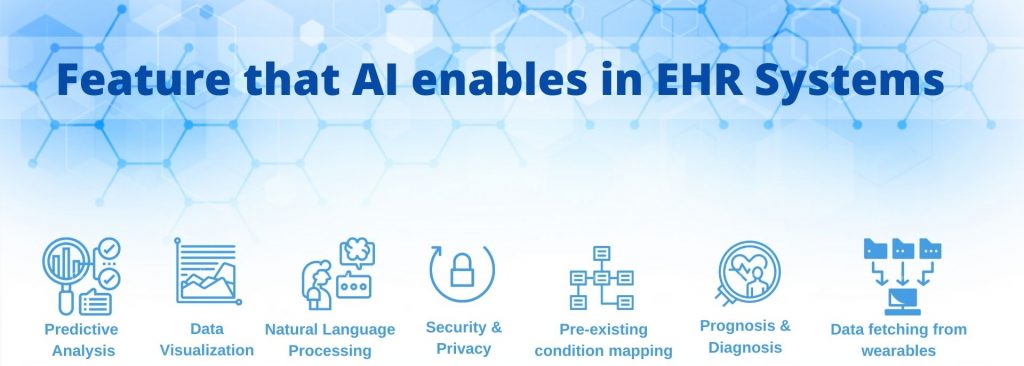What is Artificial Intelligence in Health Information Management?
Artificial Intelligence (AI) has been making great strides in recent years and is transforming many industries, including healthcare. One of the areas where AI is having a significant impact is in the diagnosis and detection of diseases using electronic health records (EHRs). The use of artificial intelligence in healthcare has increased over time.
Use of AI over Electronic Health Records
Electronic health records are digital records of a patient’s medical history that are maintained by healthcare providers. These records contain a wealth of information including patient demographics, diagnostic images, laboratory results, and clinical notes. AI algorithms can be trained on this data to identify patterns and make predictions about disease diagnosis and treatment.

One of the advantages of using AI in diagnosis and detection is that it can analyze vast amounts of data much faster and more accurately than human doctors. This leads to improved accuracy and speed of diagnosis, reducing the risk of misdiagnosis and enabling early detection of diseases.
One example of AI in use for diagnosis and detection is the development of AI algorithms that can analyze medical images, such as x-rays and MRIs, to identify and diagnose diseases. These algorithms can detect features in images that are not easily visible to the human eye and can provide a more accurate and faster diagnosis.
Another area where AI is being used for diagnosis and detection is in the analysis of large amounts of patient data. AI algorithms can be trained on EHR data to identify patterns and correlations between various diseases and patient characteristics, enabling earlier and more accurate diagnosis. Hence, it is useful for keeping accurate AI medical records.
Moreover, AI can also be used to develop personalized treatment plans for patients. AI algorithms can analyze patient data and medical history to identify the best treatment options for each individual patient, taking into account their unique medical history and current health status.
By using AI, healthcare providers can analyze this data to make more informed and accurate diagnoses, predictions, and treatment plans for their patients.
One of the key benefits of AI in decision making for EHRs is that it can help identify patterns and relationships in data that would otherwise go unnoticed by human healthcare providers. For example, AI algorithms can analyze large amounts of patient data to identify risk factors for certain diseases and conditions, helping providers make earlier diagnoses and start treatments more quickly. AI can also help healthcare providers identify patients who are at high risk for readmission or other complications, enabling them to take proactive steps to prevent these events from happening.
Use of Artificial Intelligence in Healthcare
Another important advantage of AI in decision making for EHRs is that it can help improve the accuracy of diagnoses and treatments. For instance, AI algorithms can help healthcare providers identify the most effective treatments for specific patient populations by analyzing large amounts of patient data and using machine learning to identify the best treatments based on individual patient characteristics. AI can also help healthcare providers make more informed treatment decisions by analyzing imaging data and other medical records, helping providers to identify the most effective treatments for specific patients based on their unique medical histories and symptoms.

One of the challenges in implementing AI in decision making for smart electronic health records is the need for accurate and up-to-date medical data. For AI algorithms to be effective, they need access to large amounts of high-quality patient data, and this data must be updated regularly. In addition, the algorithms used for AI decision making must be validated to ensure that they are accurate and reliable. This requires significant investment in both data and algorithms, and it is essential that healthcare providers work closely with technology companies and experts in the field to ensure that AI is used effectively and appropriately in decision making for EHRs.
Another challenge in implementing AI in decision making for EHRs is privacy and security. As AI algorithms are used to analyze large amounts of patient data, there is a risk that sensitive patient information could be compromised or misused. It is therefore essential that healthcare providers take appropriate measures to ensure the privacy and security of patient data, such as implementing secure data storage and access controls, as well as using secure methods for transmitting and exchanging data.
However, it’s important to note that AI is not a replacement for human doctors, but rather a tool to assist them in their work. AI algorithms are only as good as the data they are trained on, and it’s essential to ensure that the data used to train these algorithms is accurate and up-to-date. Additionally, AI algorithms should be validated through clinical trials to ensure their accuracy and safety.
In conclusion, the use of AI in the diagnosis and detection of diseases using electronic health records is an exciting development in the field of healthcare. The use of AI in decision making for EHRs has the potential to significantly improve healthcare outcomes and the quality of patient care. By using AI to analyze large amounts of medical data, healthcare providers can make more informed diagnoses, predictions, and treatment decisions, helping to improve patient outcomes and reduce healthcare costs. AI has the potential to improve the accuracy and speed of diagnosis, enabling earlier detection of diseases and personalized treatment plans for patients. However, it’s crucial to ensure that AI is used responsibly and that the algorithms used are validated for accuracy and safety. The implementation of AI in decision making for EHRs is not without its challenges, and it is important that healthcare providers work closely with technology companies and experts in the field to ensure that AI is used effectively and appropriately in decision making for EHRs. We soon post more electronic health record articles to enhance your knowledge in this technology.
